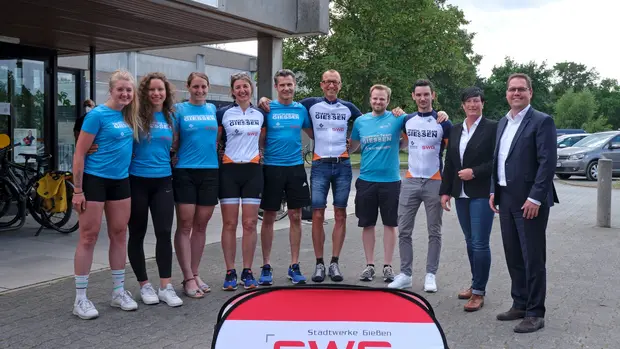
In order to be able to swim, cycle and run in the second highest German class, the athletes of the Triathlon-Team Gießen e. V. need a sponsor. They have found one in Stadtwerke Gießen.
When it comes to triathlon, the term Ironman in Hawaii usually springs to mind immediately. And not without good reason. After all, the long-distance world championship, which regularly takes place in October, is the supreme discipline. But triathletes also take part in exciting competitions at national and regional level. And it's not just about individual titles. In fact, a league system has been established for a number of years in which teams of different performance categories decide the champions among themselves. This also includes the women of the Triathlon-Team Gießen e. V. After being promoted to the regional league in the season before last, they made it through to the second national league in 2021.
In order to survive at this new level, the team needs support from committed sponsors. One of these is Stadtwerke Gießen (SWG). "Triathlon suits us very well," says Ulli Boos, SWG company spokesperson, adding: "Focusing on clear, often long-term goals and working persistently towards them - these are the virtues that unite triathlon and us." SWG's sponsorship concept also includes supporting local national league teams. "So what could be more obvious than concluding a cooperation agreement with the Giessen triathlon team," summarises Ulli Boos.
The same sport and yet completely different
Triathlon as a team sport in the league is made up of swimming, cycling and running, just like the famous Ironman. But there are clear differences. It is therefore obvious that the five competitions in a season in the second national league have to be over significantly shorter distances. "The regeneration times would otherwise be far too short," explains Philipp Neuhaus, 1st Chairman of the Giessen Triathlon Team. For example, races over the super sprint distance with 200 metres of swimming, six kilometres of cycling and two kilometres of running are common. The programme also includes sprint races with a 600-metre swim, 20-kilometre bike ride and five-kilometre run.
But the distances to be covered are not the only difference. And the absolute times play a subordinate role in assessing the team performance. It's really all about the placings in the field. In the case of the women's national league, the same 14 teams compete on each competition day, each with four athletes, three of whom are ranked. If one of them finishes 4th, another 12th and the third 23rd, the team receives 39 points. To determine the daily result, the following applies: the fewer points on the team account, the better the ranking. The champion at the end of the season is calculated according to the same principle. The placings of the individual competition days are added together.
Another difference: because teams always compete against each other, it is possible to use other competition formats. Relays, for example. Or even a combination of two competitions on one day: in a very short first part, possibly consisting of only two sub-disciplines, the starting order for the subsequent hunt race is determined. In other words, the fastest athletes go into the second part with a head start. "Formats like this make things extremely interesting because the tactics are very important," says Philipp Neuhaus.
A lot of effort - not just for training
Triathlon is a comparatively time-consuming hobby. The club's two top athletes - Vincent Größer and Janik Ortlanderl - invest up to 25 hours or more a week just for training. Which obviously pays off: both were able to qualify for the upcoming Ironman. The Bundesliga ladies don't have to go to quite that extreme. Instead, they have five competitions to travel to. The second league, which is divided into North and South, shortens the distances considerably, but the sport still takes them to Hilpoltstein in Upper Franconia, to Trebgast just before the Czech border and to Hanover for the final. "Without sponsors, we wouldn't be able to finance these trips and the overnight stays that are sometimes necessary. That's why we're very grateful to SWG for helping us out here," says Philipp Neuhaus, summarising the situation.
Unfortunately, there is no competition in Giessen - a home game, so to speak. The organisational effort involved would be too great. Ideally, you need a lake, cordoned-off routes for cycling and running, lifeguards and medical staff. For this reason, a number of organisers have emerged who take care of the competition days. Nevertheless, those interested can still watch the Bundesliga triathlon without having to travel long distances. The season finale on 4 September will be broadcast on television.
Keyword interest: If you are thinking about taking up this attractive sport yourself, the Giessen triathlon team is the right place for you. The members usually arrange to meet directly for cycling and running. For swimming, however, there are regular appointments in the Westbad - Monday and Wednesday from 6 to 8 pm and Saturday from 10 am to 12 noon.
Further information: tri-team-giessen.de and www.triathlonbundesliga.de

